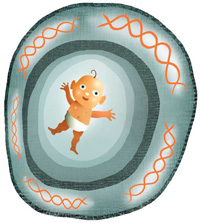Illustration by Leo Acadia

A new diagnostic test employing fetal DNA could reduce invasive procedures such as amniocentesis and chorionic villus sampling to determine if birth defects exist, according to a recent study published online in The Lancet. Master’s student Kara Franz and research colleagues at the private biotech firm where she previously worked reported a new methodology for isolating fetal DNA that is present in maternal blood. The study focused particularly on trisomy 21, the chromosomal abnormality associated with Down syndrome. In a test of 60 pregnant women, the test results were correctly established through amniocentesis or newborn reports in 58 of 60 samples. Of the two incorrectly identified samples, one was a false positive and one a false negative. With further refinement, say the study’s authors, the test could become a useful complement to available prenatal tests.
A Gentler Fetal Test for Birth Defects?
Stay up to date
Get updates on the latest stories, from hot topics, to faculty research, alumni profiles, and more—right in your inbox.
To receive issues of the Johns Hopkins Nursing semi-annual printed magazine, sign up here.

The Latest
 Birth Companions Talk Doulas and Maternal Health with Mayor Brandon Scott
Birth Companions Talk Doulas and Maternal Health with Mayor Brandon Scott Episode 36: Improving Black Maternal Health Outcomes
Episode 36: Improving Black Maternal Health Outcomes Earth Day: An Opportunity to Address the Environmental Injustice of Plastic Pollution
Earth Day: An Opportunity to Address the Environmental Injustice of Plastic Pollution BMORE Prepared to Move to Baltimore
BMORE Prepared to Move to Baltimore Forging Policy: How Can Doulas Improve Black Maternal Health?
Forging Policy: How Can Doulas Improve Black Maternal Health? No. 1 Rankings for the School of Nursing and a Pipeline to the “Best Jobs”
No. 1 Rankings for the School of Nursing and a Pipeline to the “Best Jobs”
 Faculty News
Faculty News During a Parent’s Worst Nightmare
During a Parent’s Worst Nightmare New Orleans Nursing: It's High Time for Help in the Lower Ninth Ward
New Orleans Nursing: It's High Time for Help in the Lower Ninth Ward
